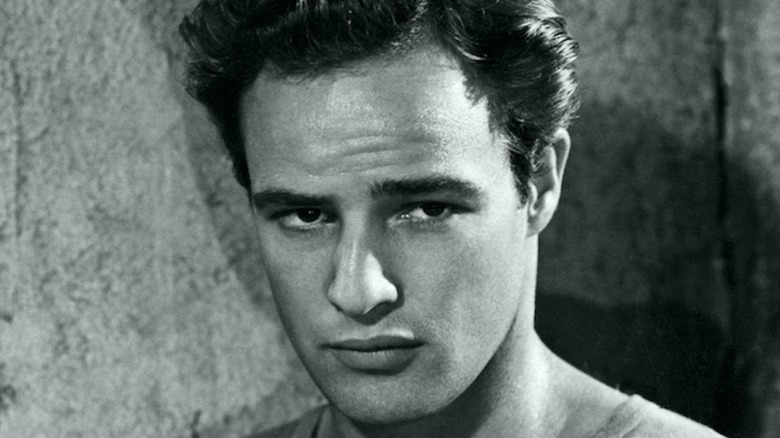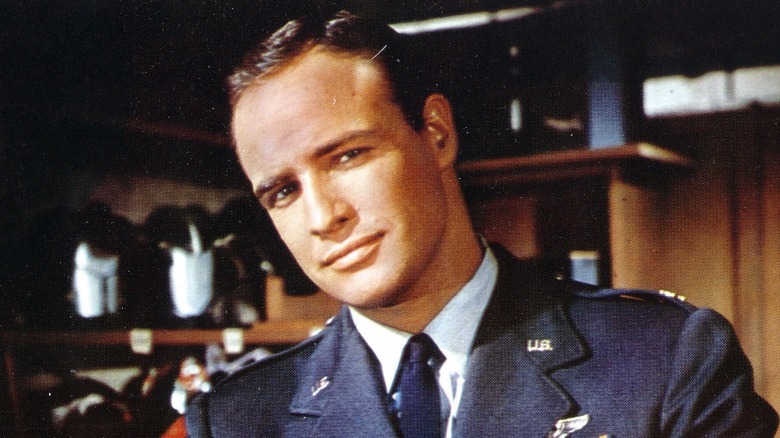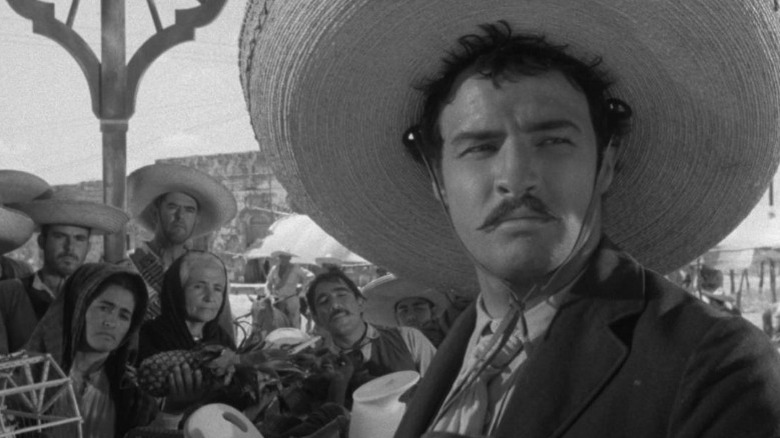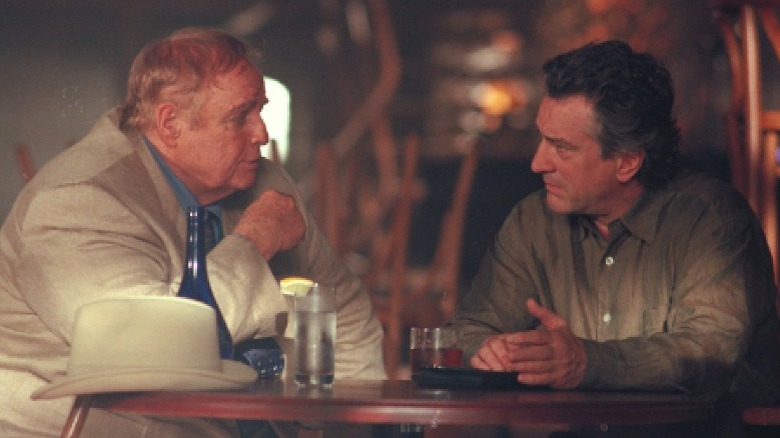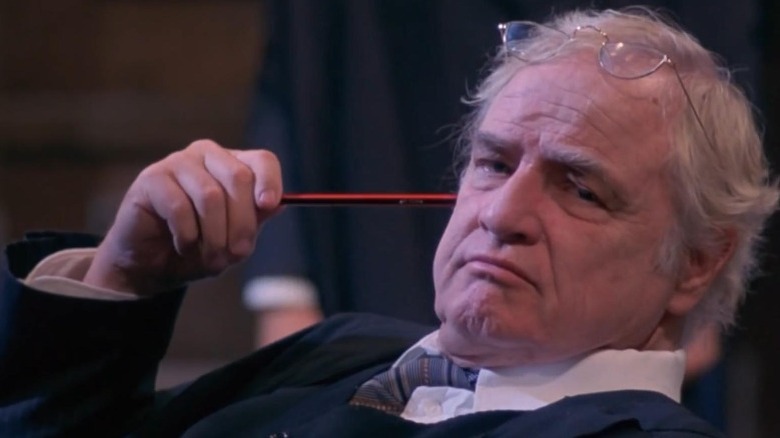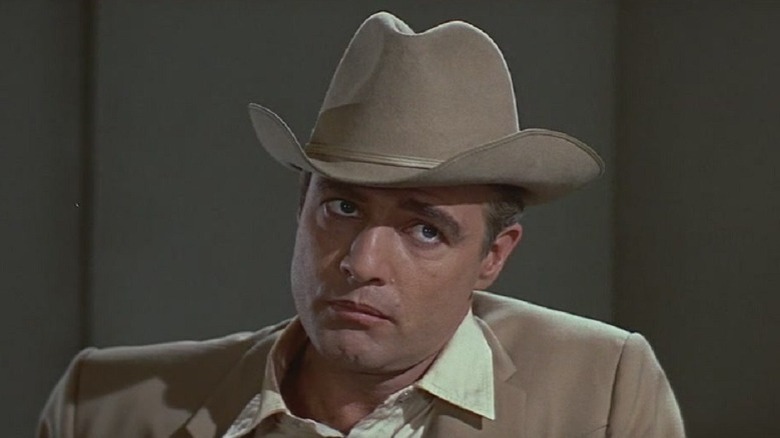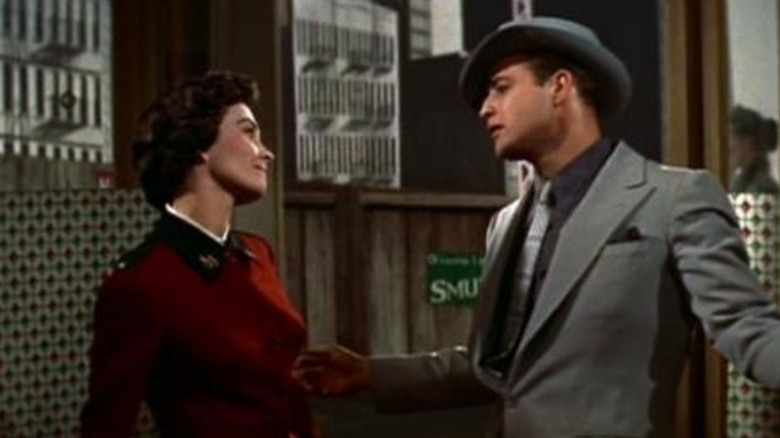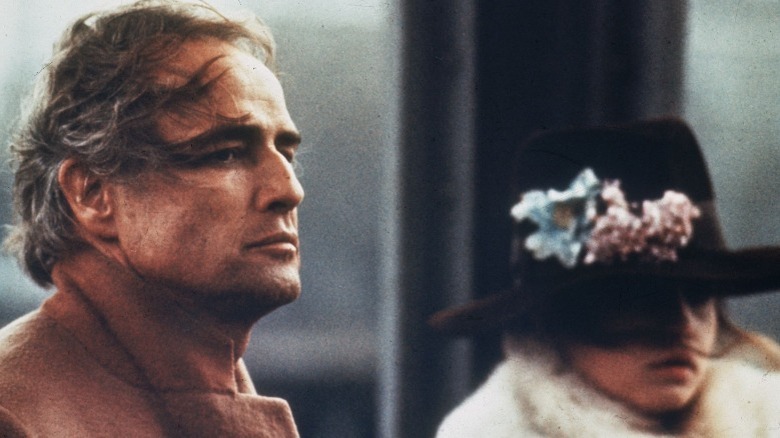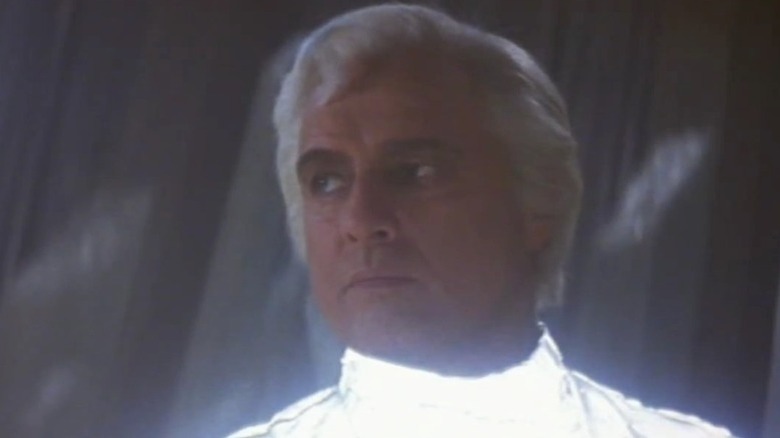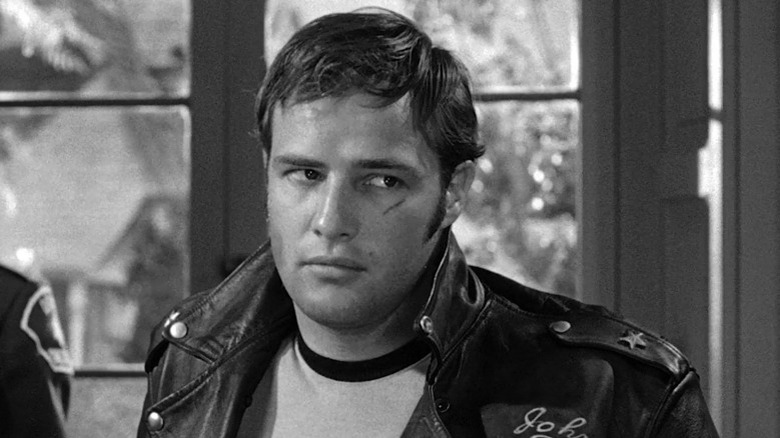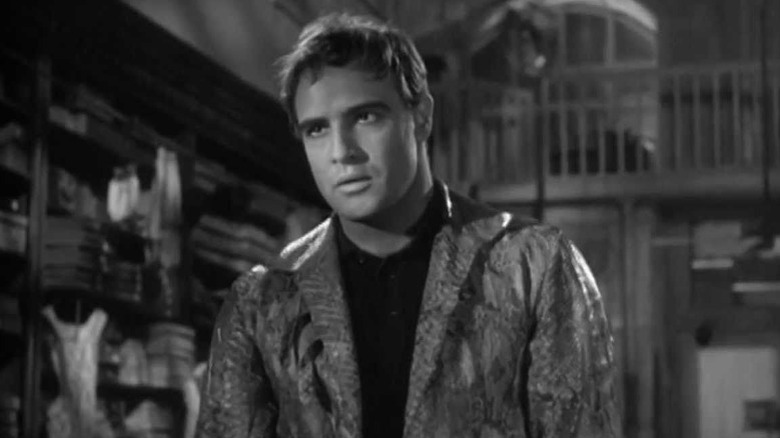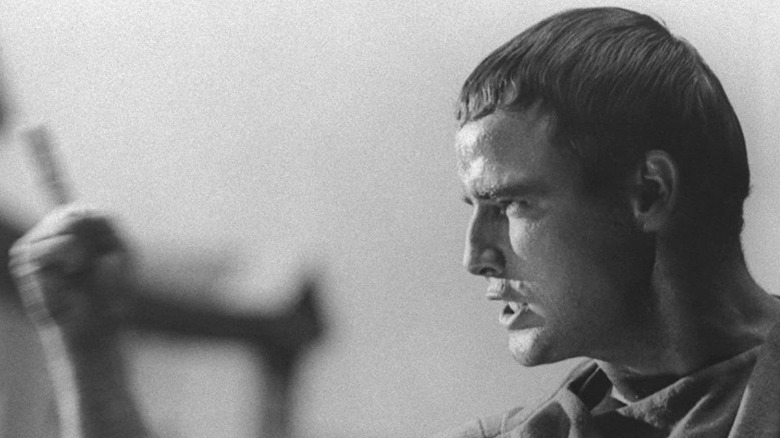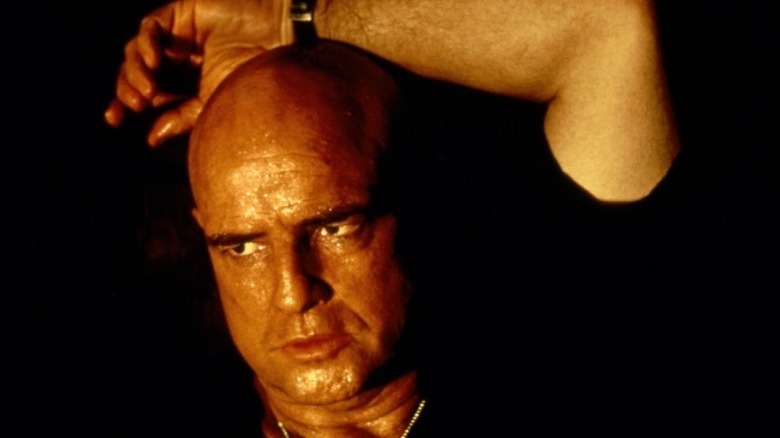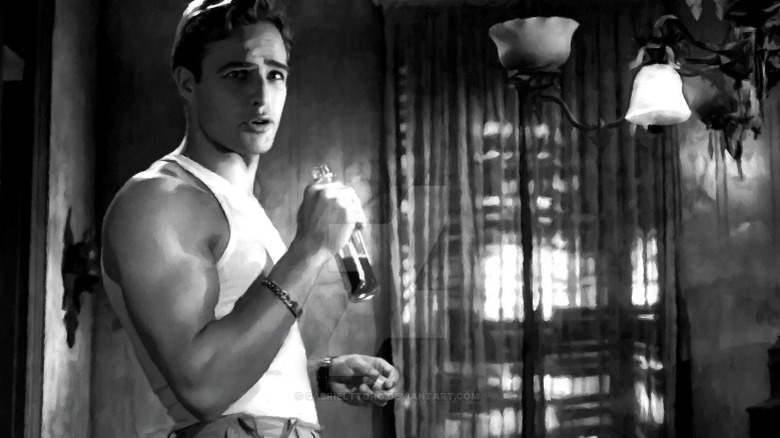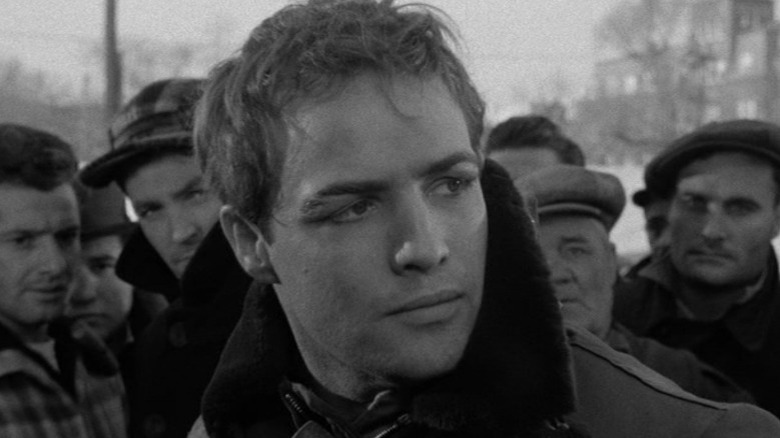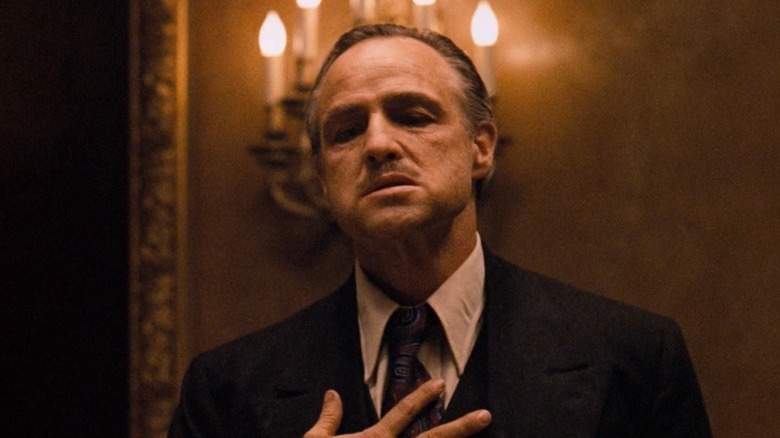The 15 Best Marlon Brando Movies Ranked
Widely considered to be one of — if not the — greatest actors of all time, Marlon Brando's career spanned more than six decades and left an indelible impact on cinema. Across the nearly 50 films he made, Brando was nominated for eight Oscars and won two, first in 1955 for "On the Waterfront" and again in 1973 for his most famous role in "The Godfather."
Brando's career began in the theater, training with famed acting teacher Stella Adler. Thanks to her tutelage, Brando popularized method acting on stage and screen and formed a naturalistic style all his own, imbuing his characters with a deep personal and emotional connection that set the bar for all actors to come. In addition to his incredible talent, Brando was also an activist who cared deeply about the Civil Rights Movement and American Indian Movement, famously sending Sacheen Littlefeather to accept his Oscar for "The Godfather" on his behalf, giving him the chance to speak publicly about the treatment of Native Americans in Hollywood.
Needless to say, Brando was an incredibly talented actor and fascinating man. With such a broad and varied career to celebrate, we've ranked his 15 best film roles from worst to best.
15. Sayonara
An intimate war film and romance, "Sayonara" takes place in Kobe, Japan in 1951, when the United States government had banned Japanese citizens from immigrating to America. This policy extended to the spouses of military personnel, which is the primary focus of "Sayonara." Brando plays U.S. Air Force Major Lloyd Guvner, who is initially opposed to the idea of Americans marrying Japanese women.
However, when one of his good friends falls in love and marries a local woman in Kobe, Lloyd slowly begins to change his mind, especially when he's introduced to a Kabuki performer named Hana-Ogi (Miiko Taka). The politics and race relations of the film are deeply troubling and don't hold up to the scrutiny of the modern era at all, but Brando still manages to find depth in a somewhat shallow character. While it's not his most moving romantic lead, Brando is still convincing as a man who slowly shifts his worldview over the course of the film without being overly preachy, earning him his fifth Oscar nomination.
14. Viva Zapata!
Brando's second film with director Elia Kazan follows a fictionalized account of the life of Mexican revolutionary Emiliano Zapata (Brando). The film takes place in 1909 Mexico, when Zapata brings a complaint about the government's infringement on his land to the president. This sets off Zapata's journey to become a leader in the effort to overthrow Porfirio Díaz and create a new government.
Though the film is competently made, it has huge issues of representation in casting, including the fact that Marlon Brando is playing a Mexican character at all. While his hair and makeup are distracting enough, Brando also adopts an odd, stilted diction that seems to be his take on an accent, all of which hinders an otherwise thoughtful and measured performance. It's a testament to Brando's talent and abilities that, even when he's at his worst, he delivers an overall incredible performance, one that earned him his second Oscar nomination.
13. The Score
Despite his incredible talent, Brando had an uneven career with high highs and low lows, perhaps due to the fact that he was notoriously difficult to work with. "The Score" marks Brando's last feature film appearance before his death three years later, and it's fascinating to watch his evolution as an actor. The film follows Nick (Robert DeNiro), an expert safecracker who is ready to retire until a young, arrogant thief (Edward Norton) persuades him to do one last heist.
Brando plays Max, Nick's fence who helps him move stolen goods and find new targets. As Max, Brando doesn't get a lot of screen time, but per usual, he makes the most of what he has. While Brando seems hindered by his declining health, he still delivers a funny and naturalistic performance, working particularly well with DeNiro, the other actor to win an Oscar for playing Vito Corleone. Overall, "The Score" is an incredible film that puts a final bow on the career of one of the greatest film actors of all time.
12. A Dry White Season
In part because of his leftist politics, Brando made several message films throughout his career, some more successful than others. "A Dry White Season" is perhaps one of the more thoughtful political films that Brando made, depicting a privileged white man's journey to becoming involved in apartheid in South Africa. Ben Du Toit (Donald Southerland) is a teacher who is aware of apartheid but largely ignorant of the law's daily impacts until his Black gardener's son goes to jail for playing with his own child.
When Ben starts an inquiry into the case, he recruits the help of an attorney, McKenzie (Marlon Brando), who routinely fights and loses similar cases in the courts. Because the film largely focuses on Ben's arc, Brando has limited screen time as McKenzie, but his story culminates in a moving courtroom scene reminiscent of Gregory Peck's turn as Atticus Finch. Brando's performance earned him his eighth and final Oscar nomination for a role that is both rousing and thoughtful.
11. The Chase
A sprawling crime thriller, "The Chase" centers on the impact an escaped convict has on a small southern town. When Sheriff Calder (Marlon Brando) hears that Bubba Reeves (Robert Redford) has broken out of jail, he expresses little concern, convinced that the criminal won't be reckless enough to come back home. Unfortunately, that's exactly what happens, forcing Calder to act. While his goal is to maintain justice and bring Reeves in alive, everyone in town has competing interests, starting a mutinous manhunt that has deadly consequences.
Calder is a different role for Brando, more reserved and neutral than the other authoritative characters he played. Calder's detached demeanor can make him seem a bit wooden, but serves as a sharp contrast during the film's climax when his morals are put to the test against the rest of the town's. While it's not his most dynamic performance, Brando still commands the screen as the quiet and commanding Calder in a credible performance.
10. Guys and Dolls
While Brando didn't star in as many films as other actors of his caliber, he still managed to make a wide variety of movies and create many different characters. "Guys and Dolls" reunites Brando with director Joseph L. Mankiewicz and sees him take on a different type of role entirely as the romantic lead in a musical. The film follows Frank Sinatra as Nathan Detroit, the host of a weekly craps game that every gambler in New York City wants to attend.
However, on this particular week, Nathan doesn't have the money needed to rent a location for the game, so he bets Sky Masterson ( Brando) $1,000 that he can't convince a Salvation Army girl to go to Havana with him in the next 24 hours. Sky accepts and soon finds himself falling in love with his mark. Brando gives a solid effort in his musical performances, making him far from the worst actor to sing on screen. Additionally, "Guys and Dolls" once again finds Brando mining a morally ambiguous character for relatability and pathos. Brando plays the role with subtle charm and swagger, making this an understated star role.
9. Last Tango in Paris
Bernardo Bertolucci's masterpiece follows two people who engage in a secretive romantic tryst to disastrous consequences. Paul (Brando) is recovering from his wife's sudden and unexpected suicide, while Jeanne (Maria Schneider) has anxiety about her impending wedding, amplified the fact that her fiancé is shooting a documentary about her. The two meet while looking at an apartment and begin an illicit affair, sharing no information about their true identities, not even their names. As their affair comes to a close, Paul refuses to let go, forcing Jeanne to take drastic measures.
The film was controversial at the time of its release due to its graphic depictions of sex, which are all the more upsetting in light of Schneider's later discussions of her treatment on set. In spite of the issues with the film, Brando delivers a moving portrayal of a confused, hurt, and abusive man. It's as layered as any of his other characters, and resulted in his seventh Oscar nomination.
8. Superman
Richard Donner's superhero epic changed the genre forever, introducing mainstream audiences to Christopher Reeve's Superman and his alter ego, Clark Kent. The film tells Clark's origin story, beginning with his time as a baby on Krypton, an advanced alien world facing a world-ending disaster. Krypton's chief scientist, Jor-El (Brando), sends his son, Kal-El, the sole survivor of the planet, to live among and be raised as a human.
Because the film mostly follows Kal-El's adventures as Superman, Brando's Jor-El has limited screen time. However, Brando manages to make a huge impact with a nearly unrecognizable performance that features a loud and clear voice that's miles away from the mumbled speech that made him famous. As Jor-El, Brando commands the screen and brings a gravitas to what could otherwise be a silly role, lending emotional weight to a serious story of a lost father and his son.
7. The Wild One
Johnny Strabler (Brando) is the leader of the Black Rebels Motorcycle Club, which arrives in a quiet, small town much to the dismay of the locals and the sheriff. Johnny hates cops, but generally obeys the law, even as his gang causes trouble. While the sheriff disapproves, he doesn't do much to stand up to Johnny and the Black Rebels, despite protests from the rest of the town.
However, things take a turn when Johnny falls in love with the sheriff's daughter and deals with the arrival of another gang. Throughout his career, Brando perfected the ability to play morally questionable characters who had full hearts that made them empathetic and warm. Johnny is a great example of this, a reluctant leader who has to reevaluate his beliefs and learn what it means to truly stand up for what he believes in. Furthermore, Brando's charm is off the charts, without ever feeling like overkill.
6. The Fugitive Kind
Working with classic director Sidney Lumet, "The Fugitive Kind" places Marlon Brando once again in the world of a Tennessee Williams melodrama. This time, Brando stars as Valentine "Snakeskin" Xavier, a drifter who floats in and out of jail. When Val arrives in a small southern town with hopes of going straight, he catches the attention of numerous women there, particularly Lady Torrance (Anna Magnani), who offers him a job in her mercantile store.
As the two develop a friendship, something deeper blooms between them, but complicating matters is Lady's sick and jealous husband, Jabe (Victor Jory). While Val is trying to make a better life for himself, his past haunts him, and the sheriff asks him to leave just as Jabe's jealousy reaches a disastrous fever pitch. As Val, Brando makes it easy to see why the women there are attracted to him, yet there's also something deeper behind his eyes, a desperation to make things right for himself as well as those around him.
5. Julius Caesar
An epic adaptation of the classic Shakespeare play, "Julius Caesar" follows political machinations and maneuvers in Rome. With growing concern that Caesar is going to use his popularity to turn his elected position into a dictatorship, a group of conspirators convince his close friend, Brutus (James Mason), to kill him for the good of the country. When another one of Caesar's advisors, Marc Antony (Brando), learns of Brutus' betrayal, he gives an impassioned speech to the public and challenges Brutus to a duel, leaving the fate of Rome up to the winner.
In his first film with Joseph L. Mankiewicz as director, Brando handles Shakespeare's difficult dialogue masterfully and delivers an impassioned and moving performance. With Shakespeare, an actor's delivery can make all the difference in the audience's connection to the story and character. As Antony, Brando delivers one of the play's most famous monologues with precision, making it a singular take on the classic character that landed him his third Oscar nomination.
4. Apocalypse Now
Reuniting with Francis Ford Coppola after his Oscar-winning turn in "The Godfather," Brando delivers another singular performance in the sprawling, existential Vietnam war epic, "Apocalypse Now." The film follows Captain Willard (Martin Sheen), a special intelligence agent sent on an inside job to assassinate a rogue Green Beret officer, Colonel Kurtz (Brando), who now lives as a demigod in the jungle. The film largely follows Willard's journey into the heart of the jungle to find Kurtz and his growing obsession with the man he's been assigned to kill.
While he looms large over the film, Brando only appears in a mere 15 minutes, and yet still manages to create a lasting, iconic performance. Kurtz is an eerie and unsettling character who is somehow also alluring and charismatic. In a few sparse scenes, Brando easily sells the audience on Kurtz's worldview, building the tension as Willard must decide whether or not to kill him.
3. A Streetcar Named Desire
Elia Kazan's adaptation of Tennessee Williams' stage play formed the beginning of a fruitful partnership between the director and Brando, who starred as Stanley Kowalski in one of his most famous roles. The film follows two sisters, Stella (Kim Hunter), Stanley's wife, and Blanche (Vivien Leigh), Stella's flirtatious but troubled sister who arrives to stay with Stella and Stanley under somewhat mysterious circumstances. As the film progresses, Stanley becomes increasingly fixated with Blanche's unconventional lifestyle, causing heightened physical and emotional tension between Stella and Stanley, and eventually Stanley and Blanche.
Kazan previously directed Brando as Kowalski on Broadway, and the film is a testament to Brando's magnetism and raw appeal, regardless of the likability of the character. On paper, Stanley is a downright despicable person, but Brando brings him to life with an impressive level of empathy and sizzling charisma, making for a performance you can't take your eyes off of.
2. On the Waterfront
Next to Vito Corleone and Stanley Kowalski, Terry Malloy may be Marlon Brando's most famous role. "On the Waterfront" reunites Brando with Elia Kazan for a third time and follows the corruption in New York's longshoreman unions. Terry is a one-time prizefighter who spends his days ignoring the depravity around him, particularly because his older brother, Charley, is at its center. When he witnesses a murder and becomes romantically involved with the victim's sister (Eva Marie Saint), he's moved to testify against the criminals who have hemmed in his life.
"On the Waterfront" has one of the most famous lines in cinema history, but to actually witness Brando deliver "I coulda been a contender" is still a shockingly moving and transformative moment for the audience. As Terry, Brando convincingly and tenderly portrays someone who gave up a promising career to please his brother, only to question his sacrifices. The performance is never theatrical or over the top, but unceasingly empathetic, earning Brando his first Oscar.
1. The Godfather
Arguably his most famous character, Don Vito Corleone is also Brando at his best. Francis Ford Coppola's gangster masterpiece follows Brando as the head of the Corleone crime family and his struggle to maintain power in a changing world. Brando brilliantly and subtly portrays Vito as a man full of intelligence and warmth, with plenty of kindness and generosity for those who respect him, and an equal amount of ruthlessness and apathy for those who do not.
When rival crime lord Sollozzo (Al Lettieri) wants to expand into the drug business, he needs Vito's approval. The Don refuses, igniting a violent gang war that threatens Vito's life and engages his previously disinterested son, Michael (Al Pacino), in the family business. As Vito's power wanes, Michael earns and cements his place in the Corleone organization, eventually becoming the new don.
Brando's performance is transformative and studied, creating a one-of-a-kind mafioso who many would attempt to imitate, but who none would ever come close to capturing. With his quiet and commanding delivery, Brando created one of the most iconic characters in cinema history, delivering him his second and final Oscar.
